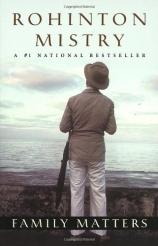Critical Praise
"Stealthily, even movingly, Mistry reveals small triumphs of humanity over distaste, minute shifts that signal leaps of compassion."
——The Guardian (UK)
"Mistry has created a meticulously evoked, deliberately paced portrait of decay and ruin. . . . It is not a pretty picture, but Mistry makes it warmhearted and stirring all the same."
——Time Out New York
"As compelling and rich as either of Mistry's other novels . . . the world in a two-room flat. . . . Mistry depicts the sort of family love that grounds us in the world."
——Globe & Mail
"Imagine a 19th-century realist sensibility probing the abiding mysteries of India in our time. Leo Tolstoy meets R. K. Narayan. . . . Mistry's compassion for [his] people is boundless."
——Newsday
"A wonderfully perceptive and sometimes hilarious exploration of the complexities of family life. . . . A novel of great wisdom, beauty and power–a book to be treasured."
——Buffalo News
"Almost Tolstoyan in registry and range . . . To say Mistry captures the textures of India well and creates larger-than-life characters is to note the least of his achievements."
——The Observer (London)
"As much a tribute to the spirit of Bombay as it is a portrait of domestic life in modern India. . . . Mistry's quiet sense of humor enlivens the story and makes it a delight to follow."
——Baltimore Sun
"Worthy of the 19th-century masters."
——Time
"Subtle and true . . . His evocation of the streets and sounds of jostling Bombay is almost painfully alive."
——New York Review of Books
"Rohinton Mistry is not a household name, but it should be. . . . he ought to be considered simply one of the best writers, Indian or otherwise, now alive. . . . Major writers differ from minor ones. . . in their ability to handle the big questions: death, family, the passing of time, the inevitability of loss, God or the corresponding God-shaped hole. Mistry handles all of them in an accomplished style entirely his own."
——The Atlantic
"Mistry's prose is expansive, generous to its characters and ample in story. . . . Frequently clear-eyed, courageous and deeply entertaining."
——The Oregonian
"Mistry . . . solidifies his standing as one of the world's finest authors. . . Come to [this book] with the anticipation or foreboding you'd bring to a letter from home. You'll be rewarded luxuriously."
——The Seattle Times
"Mistry [is] a giant of a writer. . . . [an] almost perfect example of the storyteller's art."
——Chicago Tribune
"Mistry writes with a patient attention to language, structure, and detail reminiscent of. . . .Tolstoy and Tagore… His greatest strength lies in depicting the human heart, in all its longing and imperfection, with unsentimental tenderness."
——San Francisco Chronicle
"Mistry harks back to the 19th-century novelists. . . . The reader is moved, even to tears."
——John Updike, The New Yorker
"[Mistry] needs no infusion of magical realism to vivify the real. The real world, through his eyes, is magical."
——The New York Times







